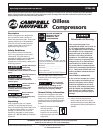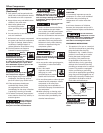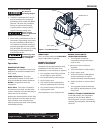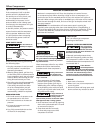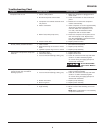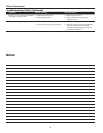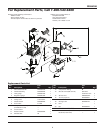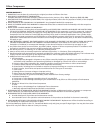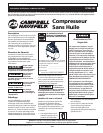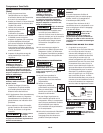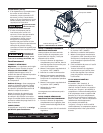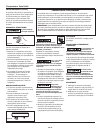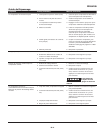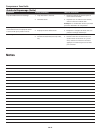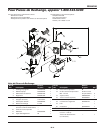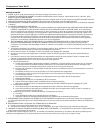
4
Oilless Compressors
www.chpower.com
Operation (Continued)
If the compressor is left in the ON
position and air is depleted from
the tank by use of a tire chuck, tool,
etc., the compressor will restart
automatically at its preset “cut-in”
pressure. When a tool is being used
continuously, the compressor will cycle
on and off automatically.
In the OFF position, the pressure switch
cannot function and the compressor
will not operate. Make sure switch
is in OFF position when connecting
or disconnecting power cord from
electrical outlet.
ASME SAFETY VALVE
Do not remove or
attempt to adjust
the safety valve!
Figure 3
Check the safety valve by performing
the following steps:
1. Plug the compressor in and run until
shut off pressure is reached (see
Operating Procedure).
2. Wearing safety glasses, pull the ring
on the safety valve to release pressure
from compressor tank. Use your other
hand to deflect fast-moving air from
being directed toward your face.
3. The safety valve should automatically
close at approximately 40-50 PSI.
If the safety valve does not allow
air to be released when you pull
on the ring, or if it does not close
automatically, it MUST be replaced.
REGULATOR KNOB
1. This knob controls air pressure to an
air operated tool or tire chuck.
2. Turn knob clockwise to increase air
pressure.
3. To lower air pressure turn knob
counterclockwise.
4. Turn fully counterclockwise to shut
off flow of air completely.
Figure 4
Maintenance
Disconnect power source
then release all pressure from
the system before attempting
to install, service, relocate or perform
any maintenance.
Check compressor often for any visible
problems and follow maintenance
procedures each time compressor is
used.
Safety valve must
be replaced if it
cannot be actuated or it leaks air after
ring is released.
1. Turn compressor off and release
pressure from system. (To release
pressure from system, pull ring on
ASME safety valve. Deflect escaping
air by shielding valve with one hand
as you pull ring with other hand.) Pull
ring until tank is empty.
A large amount of
fast moving air will
be released when the safety valve is
opened with pressure in the tank. Wear
ANSI approved Z87.1 safety glasses.
2. Drain moisture from tank by opening
drain valve underneath tank. Tilt tank
to remove all moisture.
3. Clean dust and dirt from tank,
air lines and pump cover while
compressor is still OFF.
LUBRICATION
This is an oilless type compressor
requiring no lubrication.
THERMAL OVERLOAD PROTECTOR
This compressor
is equipped with
an automatic reset thermal overload
protector which will shut off motor if it
becomes overheated.
If thermal overload protector shuts
motor OFF frequently, make sure that
the compressor is used in a clean, well-
ventilated area where temperature will
not exceed 100° F.
If the thermal
overload protector
is actuated, the motor must be allowed
to cool down before start-up is possible.
The motor will automatically restart
without warning if left plugged into
electrical outlet and unit is turned on.
STORAGE
1. Drain tank of moisture.
2. When not in use, store compressor in
a cool dry place.
3. Disconnect hose and hang open ends
down to allow any moisture to drain.
MOISTURE IN COMPRESSED AIR
Moisture in compressed air will form into droplets as it comes from an
air compressor pump. When humidity is high or when a compressor is in
continuous use for an extended period of time, this moisture will collect in
the tank. When using a paint spray or sandblast gun, this water will be carried
from the tank through the hose, and out of the gun as droplets mixed with
the spray material.
IMPORTANT: This condensation will cause water spots in a paint job,
especially when spraying other than water based paints. If sandblasting, it
will cause the sand to cake and clog the gun, rendering it ineffective. A filter
in the air line (MP3105), located as near to the gun as possible, will help
eliminate this moisture.



